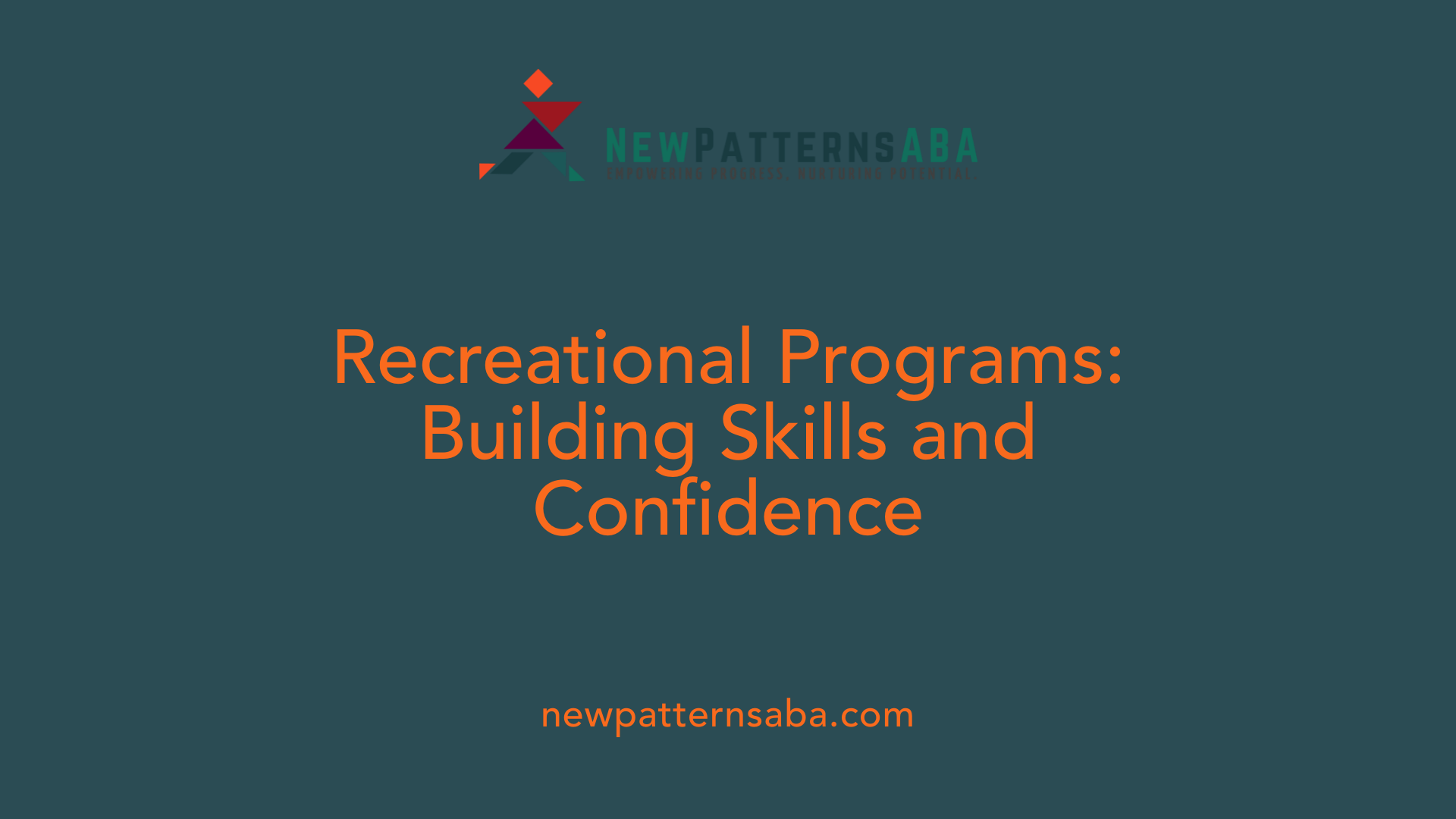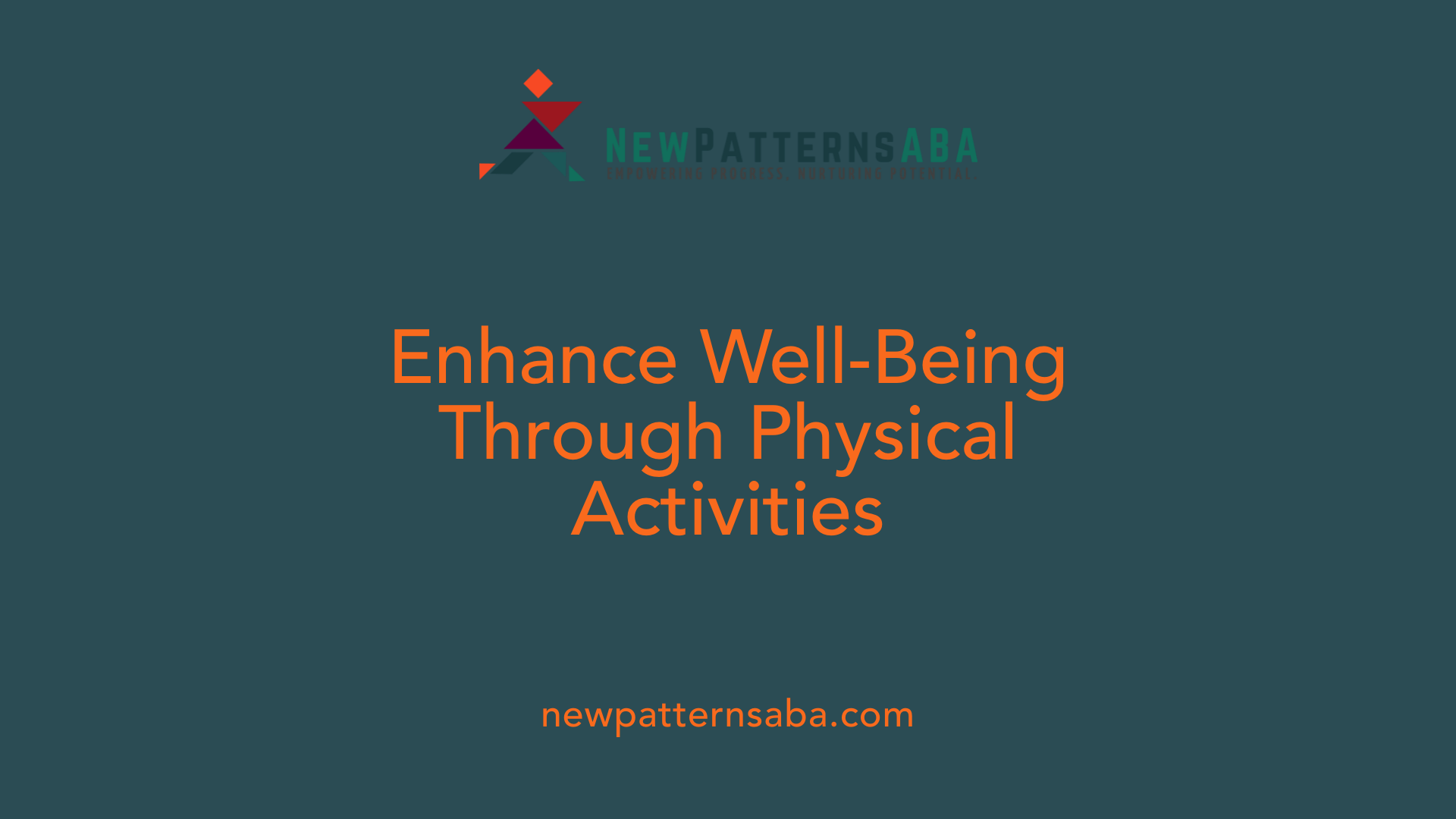Unlocking the Potential of Organized Activities in Autism Care
Organized leisure activities play a vital role in supporting the holistic development of individuals with autism spectrum disorder (ASD). From fostering social skills and emotional regulation to improving motor functions and overall health, these structured programs offer a multitude of benefits. This article explores how such activities contribute to a better quality of life for both children and adults with autism, emphasizing their importance in therapeutic, developmental, and well-being contexts.
The Significance of Structured and Predictable Routines

Why are structured and predictable routines important for children with autism?
Structured and predictable routines play a crucial role in the development and well-being of children with autism. These routines provide a sense of security, helping children feel more in control of their environment. When routines are consistent, they reduce feelings of uncertainty and help manage anxiety stemming from unexpected changes.
Using visual supports, such as charts, schedules, and visual cues, enhances understanding and helps children anticipate upcoming activities. This clarity fosters independence and encourages active participation in daily tasks. When routines are flexible enough to allow adjustments, children learn to adapt gradually, promoting emotional regulation and smoother transitions.
Involving children in creating their schedules can boost motivation and cooperation. Positive reinforcement and encouragement further support engagement and foster self-confidence. Overall, routines that are tailored to the individual needs of children with autism can improve behavioral, social, and developmental skills.
How routines reduce anxiety and promote stability
Predictable routines act as a safety net, providing a sense of stability that helps children with autism navigate their daily lives more comfortably. Consistent routines diminish unpredictable moments that often trigger stress or emotional outbursts.
When children know what to expect, they can prepare mentally for transitions, reducing nervousness. Routine activities help establish a structured environment where children can focus and learn new skills at their own pace.
Clear routines also enable children to independently perform tasks, strengthening their autonomy. This consistency becomes a foundation for building trust and confidence, which are vital for emotional health.
Use of visual supports and flexible routines
Visual supports are essential tools in creating effective routines. These include picture schedules, charts, and visual prompts that make routines visible and understandable.
Visual aids help children with autism anticipate what comes next, making transitions more manageable and reducing confusion.
While routines should be stable, incorporating flexibility allows children to learn adaptability gradually. For example, visual schedules can have flexible segments where children can choose activities, promoting autonomy.
Balancing structure with flexibility fosters resilience and helps children develop coping strategies for unforeseen changes. This approach enables children to feel secure while also building their capacity to handle new or unexpected situations.
| Aspect | Description | Benefits |
|---|---|---|
| Visual Supports | Use of pictures, charts, and aids to depict routines | Enhances understanding; reduces anxiety |
| Consistent Routines | Same activities at similar times daily | Builds security and predictability |
| Flexible Routines | Incorporate choices and adaptable segments | Promotes independence and adaptability |
| Parental and Educator Role | Support and reinforce routines | Strengthens behavior management and learning |
Implementing routines with these elements creates an environment conducive to growth, learning, and emotional stability for children with autism.
Benefits of Organized Leisure Activities for Individuals with Autism
What are the benefits of organized leisure activities for individuals with autism?
Organized leisure activities hold significant value for people with autism, supporting their development across multiple areas. These programs are particularly effective in enhancing social skills by creating opportunities for interaction with peers, instructors, therapists, and aides. Participating in team sports like hockey or engaging in activities such as dance or art therapy helps autistic individuals learn social cues, cooperation, and build relationships.
Behavior management is another vital aspect. Structured activities promote positive behavioral interventions, encouraging the use of encouraging language and fostering appropriate behaviors. Through routines and play, children learn social norms, improve impulse control, and develop better emotional regulation.
Communication and motor skills also benefit remarkably. Engaging in activities like swimming, horseback riding, or gymnastics helps improve speech, auditory processing, and physical coordination. Many physical pursuits can enhance strength, endurance, and overall physical health.
Furthermore, recreational pursuits boost self-esteem and independence. Mastering new skills in a supportive environment gives children and adults a sense of accomplishment and confidence. This empowerment often encourages greater participation and self-determination in choosing leisure activities.
Stress relief and emotional well-being are additional advantages. Activities designed to unwind or provide sensory engagement, such as aquatic therapy or yoga, can reduce anxiety, decrease repetitive behaviors, and foster relaxation.
Importantly, allowing individuals to select their preferred leisure activities promotes autonomy. Self-selected pursuits contribute to better engagement, enjoyment, and a sense of control over their leisure time, which enhances motivation and overall quality of life.
| Benefit Category | Examples of Activities | Additional Outcomes |
|---|---|---|
| Social Skills | Sports, arts, movement therapy | Improved communication, relationship-building |
| Behavior Management | Positive reinforcement through structured routines | Reduced behavioral challenges |
| Motor Skills | Swimming, horseback riding, gymnastics | Better coordination, strength |
| Physical Health | Group exercise, outdoor play | Endurance, fitness |
| Self-Esteem & Independence | Skill mastery, choice-driven activities | Confidence, autonomy |
| Stress & Emotional Well-being | Yoga, aquatic therapy | Relaxation, reduced anxiety |
| Autonomy in Leisure | Self-selected hobbies and games | Increased motivation, self-determination |
Overall, these organized programs foster holistic growth in individuals with autism, addressing social, emotional, behavioral, and physical development.
Supportive Role of Recreational and Leisure Programs
 Recreational and leisure programs play a vital role in supporting individuals with autism in multiple ways. Therapeutic benefits of these activities extend beyond simple entertainment, fostering essential social, emotional, and physical skills. For example, organized sports such as swimming, tennis, or gymnastics help improve coordination, strength, and overall physical health, while art and music therapy enhance self-esteem and communication abilities.
Recreational and leisure programs play a vital role in supporting individuals with autism in multiple ways. Therapeutic benefits of these activities extend beyond simple entertainment, fostering essential social, emotional, and physical skills. For example, organized sports such as swimming, tennis, or gymnastics help improve coordination, strength, and overall physical health, while art and music therapy enhance self-esteem and communication abilities.
Participation in such activities encourages inclusion and community involvement. Programs tailored for individuals with autism often promote natural interactions through play, group projects, and shared goals, helping children and adults develop friendships and social skills. These activities also teach important social cues like sportsmanship and cooperation, preparing participants for wider social contexts.
Stress management and coping skills are additional benefits of recreational engagement. Regular participation provides a structured and predictable environment, which offers a sense of security and reduces anxiety. Activities like horseback riding or yoga can improve sensory regulation and emotional stability, making them effective tools for managing behavioral challenges.
Moreover, recreational programs are instrumental in preparing individuals for daily life and independence. They help develop self-help skills, decision-making, and autonomy. For instance, consistent routines within these programs facilitate learning and reinforce positive behaviors, while visual supports and familiar settings ease transitions from structured routines to varied environments.
Inclusion and community involvement are further fostered through accessible recreational opportunities. These programs often incorporate adaptations and support to ensure individuals with autism can participate meaningfully, strengthening community bonds and supporting a sense of belonging.
Overall, recreational and leisure activities serve as comprehensive tools for enhancing life skills, fostering social connections, and improving emotional and physical well-being, ultimately contributing to a better quality of life for people with autism.
How Organized Leisure Activities Improve Health and Social Skills

How do organized leisure activities improve health and social skills in autistic children and adults?
Organized leisure activities play a vital role in promoting both physical health and social skills among people with autism spectrum disorder (ASD). These activities provide structured environments where individuals can engage meaningfully with peers, instructors, and family members. For children and adults with autism, participation in programs like social skills groups, role-playing, and community events encourages the development of conversational skills, empathy, and emotional understanding.
Activities such as sensory play, structured routines, and calming routines help users manage sensory overload and emotional stress. This self-regulation enhances overall well-being and increases social engagement. For example, participating in inclusive events like Autism Acceptance Month fosters social inclusion, raising awareness and promoting acceptance within the wider community.
Physical activities integrated into these programs, like swimming, horseback riding, or dancing, further bolster physical health by improving strength, coordination, and endurance. These pursuits also support mental health by reducing anxiety and repetitive behaviors, providing a comprehensive approach to health.
How do organized leisure activities address behavioral challenges?
Structured recreational programs are designed to manage behavioral challenges through positive behavioral interventions. They encourage the use of positive language and provide consistent routines that help children and adults with ASD understand expectations and reduce anxiety. Calm, predictable environments foster a sense of security, making behavioral regulation easier.
In addition, engaging in social and physical activities offers opportunities for practice and reinforcement of appropriate behaviors, which can lead to improved behavioral outcomes. The development of communication and social skills through these activities often translates into better behavior in daily life.
How do these activities support social inclusion and community participation?
Participation in organized activities helps individuals with autism become active members of their communities. By engaging in group games, sports, and cultural events, they learn social norms and develop friendships. As they practice interaction and cooperation, they become more confident in social settings.
Events and activities tailored for inclusion promote community awareness, acceptance, and support for individuals with ASD. These efforts help break down social barriers, foster mutual understanding, and encourage ongoing community engagement.
How do organized activities help develop social and emotional skills?
Engagement in leisure pursuits like art therapy, music therapy, dance, and movement therapy boosts social and emotional development. These activities enhance emotional recognition, improve social cues understanding, and foster interpersonal relationships.
For example, art therapy can increase self-esteem and social cue recognition, while music and dance encourage self-expression and body awareness. Therapeutic activities such as yoga and gymnastics improve sensory regulation, focusing skills, and confidence, further strengthening emotional resilience.
What is their impact on physical health and fitness?
Recreational programs significantly benefit physical health by improving strength, balance, coordination, and motor skills. Physical activities like tennis, exergaming, trampoline exercises, and horseback riding boost cardiovascular health, muscular endurance, and overall fitness.
Regular participation in these activities can reduce repetitive behaviors, increase attention span, and promote better sleep patterns. They also aid in developing fundamental motor skills like running, catching, and throwing, which are often areas of challenge for individuals with autism.
| Aspect | Benefits | Examples |
|---|---|---|
| Social Interaction | Enhances communication, empathy, and peer relationships | Group games, social skills groups |
| Behavioral Management | Encourages positive behaviors, self-regulation | Calm routines, positive reinforcement |
| Physical Health | Builds strength, coordination, and endurance | Swimming, horseback riding |
| Emotional Development | Boosts self-esteem, emotional awareness | Art therapy, music therapy |
| Community Involvement | Fosters inclusion and acceptance | Autism awareness events, community sports |
Through these multidimensional benefits, organized recreational and leisure activities help reduce isolation, improve health outcomes, and support overall quality of life for individuals with autism.
Physical Activities and Overall Well-Being in Autism

What role do physical activities play in the well-being of individuals with autism?
Physical activities are vital to improving the health and quality of life for individuals on the autism spectrum. These activities are not just about staying active; they are powerful tools that enhance motor skills, strength, balance, and coordination. Engaging in exercises like swimming, horseback riding, martial arts such as karate, and team sports like hockey can have profound effects on physical health.
Moreover, participating in physical activity promotes social interaction and behavioral improvements. Many programs incorporate group play, team sports, and collaborative exercises that develop social skills, foster friendships, and build confidence. For example, hockey and dance/movement therapy can improve team-building skills and body awareness, which are essential for social integration.
Physiologically, exercise benefits the brain by increasing blood flow and releasing neurotrophins such as Brain-Derived Neurotrophic Factor (BDNF). These neurochemicals support brain plasticity, learning, and emotional regulation. Additionally, physical activity helps regulate neurotransmitter levels, which can improve mood and reduce anxiety.
Beyond cognitive and emotional benefits, exercise positively influences sensory processing and gastrointestinal health, areas often affected in individuals with autism. Regular physical activity supports overall physical fitness, which can reduce stereotyped behaviors and increase attention spans.
Incorporating structured, autism-friendly physical activities into routines can maximize these benefits. Using visual supports, familiar settings, and involving family and community can make activities accessible and enjoyable. For example, trampoline fitness, motor skill training, and exergaming are engaging ways to encourage movement.
In conclusion, physical activities are essential for fostering comprehensive well-being. They improve physical capabilities, aid social and behavioral development, and support brain health, ultimately leading to a more fulfilling and healthier life for individuals with autism.
The Role of Self-Determination and Choice in Leisure Activities
How does self-determination influence leisure activities for individuals with autism?
Allowing adults with autism to make their own choices regarding leisure activities has a profound impact on their overall enjoyment and development. When individuals are empowered to select their preferred activities, they often experience higher levels of motivation and engagement.
Research highlights that participation in such self-directed programs can lead to notable improvements in social and emotional skills. For example, a yearlong recreation program offering choices like games, crafts, and community events resulted in participants demonstrating a 24% increase in their ability to recognize emotions in pictures. Additionally, there was a 50% improvement in their capacity to label these emotions.
This positive trend is not only limited to emotional recognition but also extends to fostering independence. When individuals choose their leisure activities, they develop a sense of autonomy that encourages them to rely less on caregivers and build self-confidence.
Strategies emphasizing self-determination draw upon theories that see autonomy as fundamental to human fulfillment. Providing options and involving individuals in decision-making processes helps promote self-efficacy and personal growth. These approaches contribute to a cycle of increasing independence, which supports both emotional well-being and social skills development.
Encouraging such autonomy in leisure activities is especially vital for adults with autism, as it nurtures their ability to navigate social environments, express themselves effectively, and enjoy a greater quality of life.
Conclusion: Embracing the Power of Organized Leisure
 Organized recreational activities hold significant promise for enhancing the lives of both children and adults with autism spectrum disorder (ASD). These programs provide more than just entertainment; they serve as vital tools for stress management, social skill development, physical health improvement, and emotional well-being.
Organized recreational activities hold significant promise for enhancing the lives of both children and adults with autism spectrum disorder (ASD). These programs provide more than just entertainment; they serve as vital tools for stress management, social skill development, physical health improvement, and emotional well-being.
Research highlights that participation in recreational pursuits helps buffer the negative effects of stress on quality of life, especially in adults with ASD. Engaging in activities such as swimming, horseback riding, or team sports can foster motor skills, boost self-esteem, and promote social interaction. For children, these activities also assist in reducing behavioral and emotional challenges by offering outlets for physical activity and social engagement.
Structured routines within recreational programs create a stable environment that reduces anxiety and promotes emotional regulation. Such routines help children anticipate and manage sensory experiences, improve focus, and develop independence, all while supporting skill generalization across different settings.
For adults, offering choices among leisure activities enhances enjoyment, strengthens social and communication skills, and encourages independence. Programs that respect individual preferences empower autistic individuals, fostering a cycle of increased self-determination.
Moving forward, it is essential to promote tailored recreational programs that meet the diverse needs of individuals with autism. Incorporating a variety of activities—music therapy, art projects, physical exercise, and team sports—can address multiple developmental areas. Knowledgeable facilitators and routine supports should underpin these initiatives to ensure accessibility and effectiveness.
Innovations in recreational activities and a focus on holistic well-being mark promising directions for autism care. By embracing organized leisure as a cornerstone of interventions, we can foster inclusive environments that nurture growth, confidence, and happiness for people with ASD.
Harnessing the Benefits for a Better Future
Incorporating organized leisure activities into autism care offers a powerful pathway to improve quality of life, enhance skills, and foster independence. By tailoring programs to meet individual needs—focusing on routines, physical health, social engagement, and self-determination—caregivers, educators, and communities can create inclusive environments that support meaningful development. Continued research and innovative recreational strategies hold the promise of further enriching the lives of those with autism, making organized leisure a cornerstone of holistic, person-centered care.
References
- Participation in Recreational Activities Buffers the Impact of ...
- Top 10 Benefits of Organized Recreation Programs for Children with ...
- Recreational Activities for Children with Autism
- 12 Benefits of Predictable Routines for Kids with Autism
- Freedom to choose leisure activities benefits people with autism
- Autism and exercise: Special benefits
- Autism and exercise: Special benefits
- Positive effects of physical activity in autism spectrum disorder
- Beneficial Use and Potential Effectiveness of Physical Activity in ...





